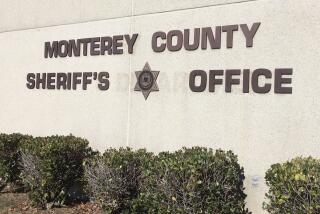Inmate’s conviction overturned
- Share via
The conviction of a man serving a life prison sentence for an East Los Angeles gang shooting has been overturned by a federal judge who ruled that the man’s attorney failed to present evidence that he was at work more than 30 miles away when the crime occurred, attorneys said Wednesday.
U.S. District Judge Gary A. Feess ruled last week that Rafael Madrigal Jr., 34, should be retried within 60 days or released from prison, where he is serving a 53-years-to-life sentence for attempted murder.
“It’s an amazing victory,” said Justin Brooks, director of the California Innocence Project at the California Western School of Law, which took up Madrigal’s case. “You’ve got an innocent person who had an ironclad alibi who ended up convicted anyway.”
The California attorney general’s office has yet to announce whether it will appeal the decision, said Jeffrey Chinn, associate director at the project. If an appeal is filed, he said, Madrigal’s lawyers plan to ask the court to release him on bail.
A deputy attorney general who is handling the case could not be reached Wednesday for comment.
Madrigal’s conviction stemmed from a July 5, 2000, shooting in which one man was shot in the head but survived during a violent feud between two East L.A. gangs.
At the time, Madrigal, whose criminal record amounted to a single misdemeanor conviction for possessing a stolen item, was a husband and father of three living in Riverside County and working as a laminating machine operator. He had previously lived in East L.A., and Los Angeles County sheriff’s deputies had identified him as a member of one of the gangs allegedly involved.
Homicide investigators focused on Madrigal after the victim and a friend of the victim identified him as the shooter from Sheriff’s Department photo lineups, according to federal court records.
In a report issued in July, U.S. Magistrate Marc Goldman described the prosecution’s case against Madrigal as “far from compelling” and based solely on conflicting eyewitness statements.
During the 2002 trial, defense attorney Andrew M. Stein called to the stand his client’s supervisor at a Rancho Cucamonga factory, about a 50-minute drive from the crime scene. The supervisor told jurors that he believed that Madrigal had been at work when the shooting took place but admitted that he could not be certain.
But Goldman faulted Stein for failing to call two other witnesses -- the factory manager and Madrigal’s brother, who worked alongside him -- who would have corroborated Madrigal’s alibi. The manager, Goldman wrote, would have made a strong witness and was prepared to testify that he was certain that Madrigal was at work because he was the only employee who could operate a particular labeling machine.
Goldman faulted the defense attorney for several other mistakes. Stein never called his client to testify, even though he had told jurors at the start of the trial that Madrigal would tell them who he believed really committed the crime.
And the attorney failed to tell jurors about a jailhouse conversation involving another man also charged in the shooting. In the secretly recorded conversation, the suspect made incriminating statements to a girlfriend and said Madrigal knew nothing about the shooting.
“Stein did not just botch one witness or one argument or one issue,” Goldman wrote, “he repeatedly demonstrated the lack of diligence required for a vigorous defense.”
Feess adopted Goldman’s findings.
Stein could not be reached for comment Wednesday.
Jurors took four days to convict Madrigal.
After the guilty verdict, Stein successfully asked for a court order for a test to compare ballistic evidence from the shooting with a gun found on a gang member arrested a year later, according to the magistrate’s report. The tests confirmed that the gun matched the one used in the shooting.
Stein filed a motion for a new trial and called the gang member to testify at a court hearing before sentencing. Madrigal testified at the hearing that the gang member had told him he was involved in other shootings during the gang feud.
The gang member invoked his 5th Amendment right to remain silent.
Nevertheless, Superior Court Judge Curtis Rappe denied the motion for a new trial and sentenced Madrigal to prison.
--
More to Read
Sign up for Essential California
The most important California stories and recommendations in your inbox every morning.
You may occasionally receive promotional content from the Los Angeles Times.














